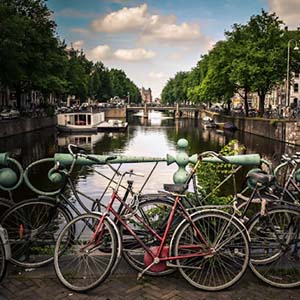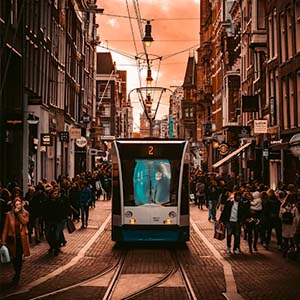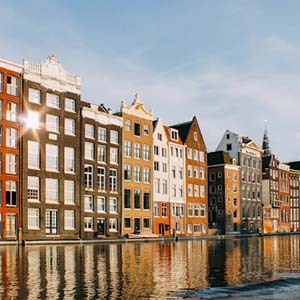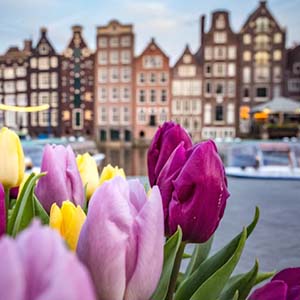Moving to Amsterdam
It can be hard to remember that this picturesque and charming place is the largest city in the Netherlands. The city earned its name in the 13th century when the inhabitants dammed the river Amstel and has since flourished as a centre for cultural and commercial activity. The construction of the canals has brought much development and tourism along the waterways, and the liberal attitudes of the 834,700 inhabitants make it a relaxed and welcoming place for foreigners. If you’re planning an international move to Amsterdam, read on!
Visas and Passports
It’s always important to sort out the necessary paperwork in time when looking to relocate. This means sorting out your passports, and any visas and permits required. Since the Netherlands is a part of the European Union, EU residents can live and work here visa-free. Following Brexit, however, individuals moving from the UK to Amsterdam or any other part of the country will need a visa for a long-term stay. UK nationals can apply for a residence permit through the Immigration and Naturalisation Service after arriving in the Netherlands.

Healthcare
The Dutch healthcare system is among the best in the world. Since 2005, the Netherlands has been the only country to feature consistently in the top three positions in the European Health Index. The country has a mandatory health insurance scheme that covers all medical services such as GP consultations, treatments, prescriptions, ambulance services, maternity care, etc. It costs approximately £90 a month, and children under 18 can be added to their parents’ scheme for free. Whether you’re moving to Amsterdam or Leiden, you need to register with a health insurance provider within four months of your arrival.
Is Amsterdam Expensive?
Although Amsterdam is in Europe’s Top 10 most expensive cities to live in, your expat status will grant you a 30% tax ruling – meaning that you will only have to pay taxes on 70% of your income. This will offset your living costs and make your financial situation very similar to back in the UK.
Getting around Amsterdam
Moving to Amsterdam will allow you to use the excellent network of public transportation that the city, and the rest of the Netherlands, has to offer. From National rail services to buses and the metro, getting around the city is cheap and simple. Where there is no metro, such as in the northern parts of the city, bus connections are well-established and punctual, meaning you can always get where you need to be on time. More information on costs and timings can be found on the GVB’s website.
Tickets can be bought in advance at stations, post offices, vending machines or from drivers or you can load your tickets onto your OV-chipkaart, which functions just like London’s Oyster card. If moving to Amsterdam, you can apply for a permanent OV-chipkaart.
For longer and hassle-free transport, taxis, though expensive, are in high supply.
Bicycles – Bicycles are hugely popular in the Netherlands, especially in cities. There is a network of dedicated cycle lanes in urban and rural areas and lock-up facilities outside most public and private buildings. Bike theft can occur, so ensure you have a substantial lock to prevent it from being stolen. You must also have a road-worthy bike, meaning that it has working lights, bell, reflectors, and good brakes.
Driving – As in any city, traffic can get bad when driving around Amsterdam, especially during rush hours. It’s important to be extra careful as the number of cyclists and moped drivers in the city can prove overwhelming to inexperienced drivers.

Accommodation in Amsterdam
The Netherlands is a very densely populated country, and this does not exclude Amsterdam. Living space can be tight in the city. Large apartments for rent are difficult to find, so finding an entire house can be difficult. Houses with more than 5 bedrooms are rare since apartments typically have between 1 to3 bedrooms. Properties in Amsterdam can be classified into 4 types:
- Row Houses – terraced houses, attached to other houses on each side
- Drive-in house – has living quarters on the upper floors with a garage on the ground floor
- Semi-detached
- Detached
In the centre of cities like Amsterdam, prime real estate is difficult to find. Accommodation is more readily available in the small autonomous towns surrounding large cities, as there are no real suburbs in the Netherlands. Commuting into cities is easy thanks to the great quality of public transport
Housing areas in Amsterdam
The historic heart of Amsterdam has retained its appearance since the 17th century, the golden age. From the Amstel River, the city is defined by concentric semicircular canals that expand southwards. The narrow streets are lined with classic high-gabled old merchant houses, as are the canal banks. North of the Amstel River is mainly an industrial space, whereas more modern expansions have continued in other directions.
Amsterdam Centre
Near the city centre, apartments can be hard to find and expensive. This area has many advantages when it comes to social life, as the village ambience is an exciting place to be, with numerous entertainment facilities and festivals year-round. Housing here will be small but very attractive, with some facades dating right back to the 17th century. Furnished properties will be simple but adequately fitted, with more lavish furniture available for a high price.
Unfortunately, the narrow, charming streets offer little in the way of parking if you have no garage with your accommodation. Public transport can, however, offer an alternative to having your own vehicle.
Amsterdam South
There are two main residential neighbourhoods in Amsterdam South – Waardhuizen and Westwijk. These newly developed areas offer attractive and affordable accommodation, often with ample street parking. Though the newness of the area has yet to wear off, shopping facilities here are excellent and connections to the city centre by bus or car are great.
Outside of Amsterdam
Residential areas outside of Amsterdam include Amstelveen, Buitenveldert, Mijdrecht, Uithoorn, and Vinkeveen. Large supermarkets are common on the outskirts of the city and public transport connections into Amsterdam from these areas are clean and punctual. Here, houses will be small, typically between 2 and 5 bedrooms, with gardens or yards. Furnished properties are not difficult to find.
If finding accommodation abroad seems impossible, find out how our Relocation Services can ease your international relocation process.

Schools in Amsterdam
There are plenty of education options if you are moving to Amsterdam from the UK with your family. Whether your children are at a pre-school, primary, or secondary level, there will be an option for them to learn. There is a great variety of international schools in and around Amsterdam, either subsidised by the government or private schools. These can cost anywhere from €3,000 to €24,000 a year in fees, however, they will provide your children with an excellent quality of education and the opportunity to meet children from 180 different nationalities.
What is life like in Amsterdam?
Living in Amsterdam is typically very easy for UK expats. With English spoken in a large percentage of the city, communication will not be a barrier between you and the linguistically proficient Dutch. Despite this, learning greetings such as ‘Hallo’ (hello) is recommended.
There are many clubs and organisations within the city which will cater to your interests and hobbies whilst allowing you to socialise and make friends once you move to Amsterdam. This includes clubs specifically for expats to meet each other. Socialising at work is also common practice, and evening meals are a great way to get to know your hosts or colleagues.
As in any city, Amsterdam has entertainment facilities for the whole family. Whether you’re looking for zoos, museums, or galleries, the city has exactly what you’re looking for. There are also year-round festivals to keep you busy, so don’t miss out! Learn more about what to see and do in Amsterdam.
The people of Amsterdam
The Dutch are very hospitable people, so they will likely invite you for meals at their own homes. Politeness and properness are also valued, so make sure to shake hands with everyone present and bring a gift for the hostess. Speaking too loudly or talking about improper topics, such as politics or money, will not earn you another invite.

Dining out in Amsterdam
It is also common to go out for meals at restaurants in the city to enjoy a range of cuisines, from Greek to Indonesian. Another tip for people moving to Amsterdam from the UK is that the Dutch typically eat very early, meaning many establishments close their kitchens at 9:30 pm at the latest. Reservations are recommended for large parties and fine dining locations. Find out more details on cuisines and reservations in restaurants in Amsterdam.
If you are relocating and need help navigating the process, check out our guide and checklist for international relocation.
Interested in information on another country? Take a look at our other International Relocation guides.
Great customer Experiences start here
Very pleasent and helpful. Nothing too much trouble.
Mr M H moved from London, UK to Toronto, Canada
Very helpful and patient even when things got packed that we had to get out again!
Mr M E moved from Enfield, UK to Dorset, UK
Thanks to Graham, Nick and the entire crew!
Mr C D M moved from UK to Singapore
Friendly and helpful crew.
Ms T W moved from USA to Cambridgeshire, UK
